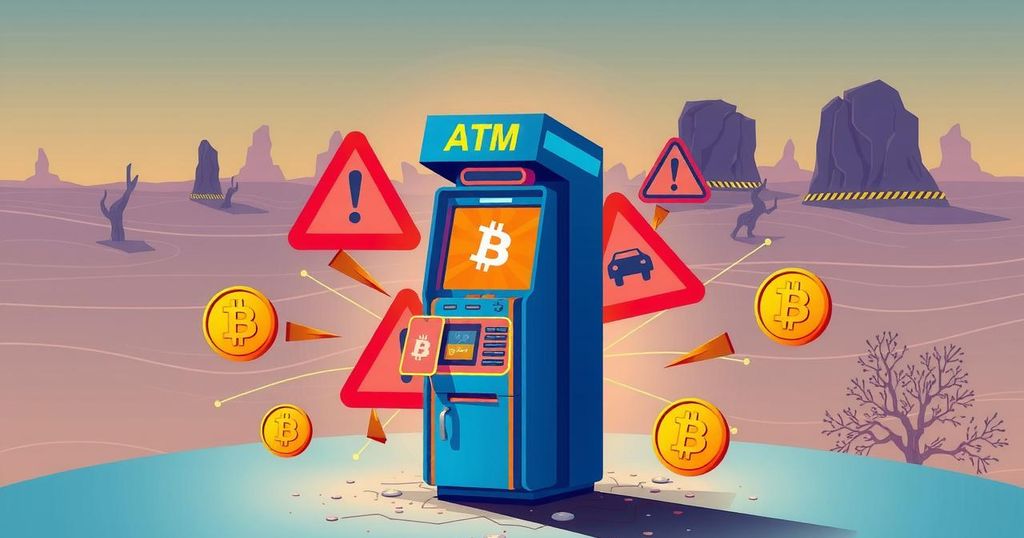Bitcoin ATM Scams in Arizona: A Rising Threat That Costs Millions
Bitcoin ATM scams in Arizona are causing millions in losses as scammers employ various deceptive tactics to exploit victims. Local authorities are concerned about the rising sophistication of these scams, which create urgency through threats related to government actions and service interruptions. Victims, even those who are cautious, are falling prey to these manipulative schemes. Law enforcement urges vigilance and public cooperation to combat this growing threat.
Summary A wave of Bitcoin ATM scams in Arizona has led to millions being stolen from victims. These scams exploit the popularity of cryptocurrencies, utilising convincing deception to manipulate users into instant cash deposits at ATMs. Local authorities are now gearing up to combat this invasive fraud that targets unsuspecting individuals under various false pretenses.
Article Body Law enforcement officers in Arizona are sounding alarms over the rise of Bitcoin ATM scams, with individuals losing significant money. These criminal activities capitalise on the boom of cryptocurrencies and the accessibility of Bitcoin ATMs. The scheme is not just stealing money but also fostering a growing distrust in digital currencies.
The scam typically begins with scammers reaching out via phone calls, messages or emails. They often employ several strategies to create urgency, such as warning victims about government actions, service interruptions, or technical failures. For instance, they might claim that the victim’s bank account is about to be frozen or that they need to pay an urgent fine via a Bitcoin ATM.
Some of the tactics used include:
– Government threats: Victims are convinced that their accounts are facing imminent freezing or that hefty fines must be paid right away.
– Service failures: Claims that major utilities like water and electricity will be cut unless immediate payments in cryptocurrencies are made.
– Bogus technical support: Impersonating technical support agents, scammers inform victims of critical computer issues that require immediate Bitcoin payments to resolve.
These tactics are designed to induce panic and quick action without giving victims time to think clearly. Recent reports indicate that the total losses from such scams are in the millions. This alarming figure includes not only financial loss but also increasing psychological distress among victims, leading to a wider fear regarding cryptocurrencies.
Amy Cutler, a journalist following the matter, recounts the story of a woman who fell victim to this elaborate scam. Initially warned of her account being frozen, the woman deposited thousands into a Bitcoin ATM on the instruction of a supposed government official. After making the deposit, the scammer vanished, leaving her in a state of disbelief and loss.
This incident demonstrates how even the vigilant can be misled by such sophisticated scams. The ease and growing use of Bitcoin ATMs in Arizona contributes to the problem, making it simpler for fraudsters to exploit unsuspecting individuals.
Local authorities note that the sophistication of these scams is rising, thanks largely to improved social engineering tactics that foster trust without proper verification. Scammers are also taking advantage of a general lack of understanding surrounding cryptocurrencies, which plays into their hands.
As a result, law enforcement urges citizens to stay alert and report any dubious activities associated with Bitcoin ATMs. Although measures to address these scams are being developed, specific details are still unclear. Cooperation among authorities, ATM operators, and the general public will be essential to effectively tackle the issue.
To protect oneself from these scams, it’s vital to verify any communications, especially those demanding immediate payment in Bitcoin or any other cryptocurrency. Remember, legitimate government bodies will not request funds via ATMs or cryptic channels. When in doubt, it’s always safer to consult official institutions before taking any action.
As crypto-related scams continue to spiral, increased awareness and information dissemination is crucial. Arizona’s situation starkly illustrates the global rise of cybercrime tied to cryptocurrencies. Educational initiatives on digital finance and cybersecurity are imperative to safeguard individuals and protect the market as a whole.
The authorities are hinting at plans to enhance monitoring and regulation of Bitcoin ATMs and educate the public. Citizens should adopt a cautious stance towards unexpected payment requests and stay informed about the ongoing developments to better navigate this murky digital landscape.
In conclusion, the ongoing Bitcoin ATM scam crisis in Arizona underlines a pressing issue with cybercrime that necessitates continuous vigilance and collaboration among everyone involved — from users to officials to the financial community. Awareness is the first step to prevention, and it’s vital to act swiftly if fraud is suspected, by reporting incidents to the appropriate authorities.




Post Comment